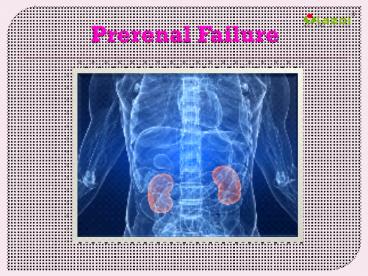Prerenal Failure: Symptoms, Causes and Treatment - PowerPoint PPT Presentation
Title:
Prerenal Failure: Symptoms, Causes and Treatment
Description:
Acute Renal Failure (ARF) is the sudden loss of kidney functionality. The causes of ARF are classified into three categories such as prerenal, renal, and postrenal. Prerenal ARF is caused by problems that affect the flow of blood, before it enters the kidneys. Postrenal ARF is caused by problems in passing of urine out of the kidneys. Renal ARF is caused by problems with the kidney itself, resulting in the improper filtration of blood or disrupted production of urine. – PowerPoint PPT presentation
Number of Views:89
Title: Prerenal Failure: Symptoms, Causes and Treatment
1
Prerenal Failure
2
Prerenal Failure
- Acute Renal Failure (ARF) is the sudden loss of
kidney functionality. The causes of ARF are
classified into three categories such as
prerenal, renal, and postrenal. Prerenal ARF is
caused by problems that affect the flow of blood,
before it enters the kidneys. Postrenal ARF is
caused by problems in passing of urine out of the
kidneys. Renal ARF is caused by problems with the
kidney itself, resulting in the improper
filtration of blood or disrupted production of
urine.
3
Causes of Prerenal Failure
- Prerenal ARF is caused mainly by the inadequate
blood circulation in the kidneys. It is the most
common type of acute kidney failures. As the
kidneys do not receive enough blood, they cannot
filter the blood properly. Following are the
causes of this disorder - Hardening of the arteries due to increased fatty
deposits inside the arteries can significantly
reduce the blood flow towards the kidneys. - Excessive consumption of diuretics, as well as
significantly reduced fluid intake can lead to
dehydration, which in turn can lead to this
disorder. - People with heart conditions are often advised to
take diuretics to prevent accumulation of fluid
in the lungs. Such patients are more likely to be
affected by dehydration and ARF.
4
Causes of Prerenal Failure
Continue
- Severe loss of blood due to a major surgery or
accident that leads to sudden drop in the blood
pressure levels, may lead to this disorder. - Chronic liver disease, which affects the
production of hormones that help maintain the
blood flow and pressure in the kidneys, may also
be a contributing factor. - Prerenal azotemia, a condition where excess
amount of nitrogen type compounds in the
bloodstream affect the function of the
kidneys and lead to the build-up of waste, such
as creatinine and urea. - Severe injury or burns, sepsis (infection in the
blood), heart failure or heart attack can
restrict the flow of blood to the kidneys.
5
Symptoms
- Dizziness
- Dry mouth
- Low blood pressure (hypotension)
- Increased heart rate
- Dry, loose skin
- Increased thirst
- Weight loss
- Decreased urine output
- Abdominal pain
- Pale skin
6
Symptoms
Continue
- Symptoms of liver disease like itching sensation,
nausea, loss of appetite, abdominal swelling,
confusion, disorientation, sweet or ammoniacal
odour, etc. - Symptoms of heart diseases like breathing
difficulty (Dyspnoea), increased fatigue, fluid
accumulation and swelling in the extremities
(edema), venous engorgement, etc.
7
Treatments
- The treatment is focused at improving the kidney
perfusion (blood circulation). The correct
diagnosis or detection of the exact cause of
kidney failure helps determine the treatment. The
effect of dehydration can be lowered by
administering intravenous fluid. Other causes
like infection, liver problem, and heart failure
need to be treated according to the types and
severity of symptoms. Since the output of urine
increases significantly with the administration
of intravenous fluids, patients diagnosed
with prerenal failure are advised to be admitted
in the hospital. The renal function improves fast
with the increased output of urine. Patients
with severe symptoms are admitted in the
intensive care units, as they have an increased
risk of heart failure or liver failure. These
patients may suffer from severe infections like
viral hepatitis. Patients diagnosed with this
disorder need prompt medication in order to
prevent health complications.
8
CONNECT WITH US
- Logon to
- www.lazoi.com
- Like us on Facebook
- https//www.facebook.com/LazoiTheLife
- Follow us on Twitter
- https//www.twitter.com/lazoithelife
- Follow us on Pinterest
- https//www.in.pinterest.com/lazoithelife































